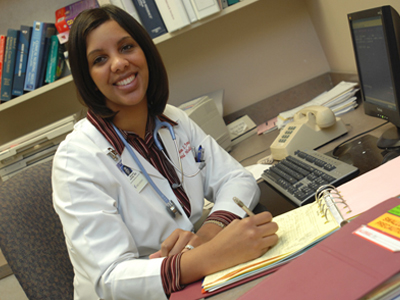Dr. Alyson Jones finds something achingly familiar in the faces of her stroke patients at Methodist Rehabilitation Center in Jackson.
Their suffering calls to mind her paternal grandmother, whose stroke-related disabilities left a lasting impression on an empathetic little girl.
“I was young, maybe 5 or 6, and I remember going to her house,” Dr. Jones said. “Whenever she saw me, she would start crying. I wanted to understand her, but I couldn’t because the stroke left her unable to speak. That affected me. I would sit there feeling sad because I wanted to help her.”
More than 20 years later, Dr. Jones still feels that longing to make a difference, a calling that has brought her to a place where her skills as a physical medicine and rehabilitation (PMR) physician are in high demand.
Mississippi leads the nation in deaths related to stroke and heart disease, a troubling trend that is particularly devastating to the African-American community.
“The U.S. Department of Health and Human Services says African-Americans are twice as likely to have a stroke as Caucasian adults, and 60 percent more likely to die,” Dr. Jones said. “They’re also more likely to become disabled and have difficulty with activities of daily living.”
Having watched her grandmother suffer such a fate, Jones is passionate about helping patients overcome stroke’s debilitating effects. “I keep in mind that this is somebody’s mother or father, and I want to help them as much as I possibly can,” she said. “Suffering a stroke doesn’t have to be the end of their lives. They can get better and still have good
quality of life.”
That focus on a person’s future capabilities drew Dr. Jones to rehab medicine. But she admits the specialty was not her No. 1 choice when she first began studies at Louisiana State University School of Medicine in New Orleans.
“I thought I wanted to do orthopedics because I had an athletic background,” said the former center for the University of Southern Mississippi’s women’s basketball team.
But as she learned more about the time constraints of a surgeon’s lifestyle, Dr. Jones searched for something more family-friendly. “I got picked to do a physical medicine and rehabilitation rotation, and when I walked up to the therapy gym and saw people working with balls and using the parallel bars ... I thought: Wow, this is where I want to be.
“The thing I like most about PMR is you’re thinking about a person as a whole and what will happen when they go home.”
Dr. Jones said stroke patients today have more reasons than ever to be optimistic about their prognosis. Acute care advances – such as the use of clot-busting drugs and stents – mean more people avoid the more severe side effects of stroke. And rehab medicine now has better therapies for treating deficits that remain.
“Improvements in spasticity treatment are a major development in the care of stroke patients,” she said. “We’ve also developed therapies to teach parts of the brain to take over functions that the injured side of the brain once provided.”
While many stroke survivors return home to reclaim their active lifestyles, they remain at heightened risk for a recurrence. Therefore, preaching stroke prevention has become second nature for the young doctor.
She cautions patients to stay on their anti-platelet medication, to keep their blood pressure and cholesterol down and to maintain a healthy weight to stave off diabetes.
“Diet always comes into play, especially here in the South where everybody loves pork chops and gravy. I’ve met more young people here with diabetes and that shocked me. When diabetes starts early, you’ve got to take care of it. Out-of-control blood sugar leads to other issues – including stroke in a younger population.”
“We’ve really got to get a health kick started,” she adds, and African-Americans, in particular, need to get on the bandwagon. “Given our inherent risks, it’s critical that we improve factors we can control.”

